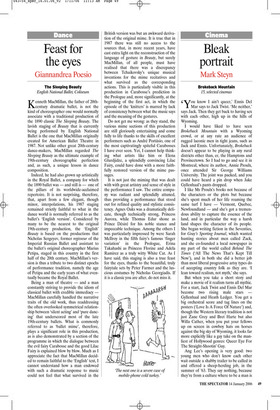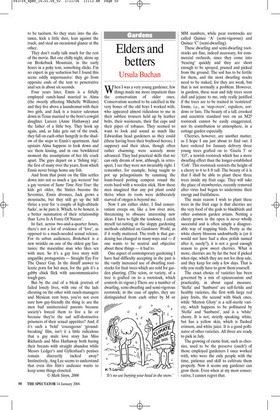Cinema
Bleak portrait
Mark Steyn
Brokeback Mountain 15, selected cinemas ‘ou know I ain’t queer,’ Ennis Del YMar says to Jack Twist. ‘Me neither,’ says Jack. Then they get back to having sex with each other, high up in the hills of Wyoming.
I would have liked to have seen Brokeback Mountain with a Wyoming crowd, or at any rate an audience of rugged laconic men in tight jeans, such as Jack and Ennis. Unfortunately, Brokeback doesn’t appear to be playing in any rural districts other than, er, the Hamptons and Provincetown. So I had to go and see it in Montreal, where its author, Annie Proulx, once attended Sir George Williams University. The joint was packed, and you could have heard a pin drop when Jake Gyllenhaal’s pants dropped.
I like Ms Proulx’s books not because of the characters or the plots but because she’s spent much of her life roaming the same turf I have — Vermont, Quebec, Newfoundland — and she’s got a tremendous ability to capture the essence of the land, and in particular the way a harsh land shapes the character of its people. She began writing fiction in the Seventies, for Gray’s Sporting Journal, which wanted hunting stories about men called Zack, and she co-founded a local newspaper in my part of the world called Behind The Times (‘All The News That’s Kept Till Now’), and in both she did a better job than most liberal progressive artsy types do of accepting country folk as they are. ‘I lean toward realism, not myth,’ she says.
But when you take a short story and make a movie of it realism turns all mythic. For a start, Jack Twist and Ennis Del Mar become two rising male stars Gyllenhaal and Heath Ledger. You get a big orchestral score and tag lines on the posters (‘Love Is A Force Of Nature’) and, though the Western literary tradition is not just Zane Grey and Bret Harte but also Willa Cather, when you put your fellows up on screen in cowboy hats on horses against the big sky of Wyoming, it looks far more explicitly like a gay take on the manliest of Hollywood genres: Queer Eye For The Straight-Shootin’ Guy.
Ang Lee’s opening is very good: two young men who don’t know each other wait outside a shabby trailer to be called in and offered a sheep-herding job, in the summer of ’63. They say nothing, because they’re from a culture where to be a man is to be taciturn. So they stare into the distance, kick a little dust, lean against the truck, and steal an occasional glance at the other.
They don’t really talk much for the rest of the movie. But one chilly night, alone up on Brokeback Mountain, in the early hours in a poky tent, something clicks. I’m no expert in gay seduction but I found this scene oddly unpersuasive: they go from opposite ends of the tent to penetrative anal sex in about six seconds.
Four years later, Ennis is a fitfully employed ranch-hand married to Alma (the sweetly affecting Michelle Williams) and they live above a laundromat with their two girls, and Jack is a tractor salesman down in Texas married to the boss’s cowgirl daughter Lureen (Anne Hathaway) and the father of a little boy. They hook up again, and, as Jake gets out of the truck, they fall on each other hungrily in the shadow of the steps to Ennis’s apartment. And upstairs Alma happens to look down and see them kissing, and in one bewildered moment the assumptions of her life crack apart. The guys depart on a ‘fishing trip’, the first of many over the years, from which Ennis never brings home any fish.
And from that point on the film settles down into not so much a ‘gay western’ but a gay version of Same Time Next Year: the kids get older, the Sixties become the Seventies, Ennis divorces, Jack grows a moustache, but they still go up the hill thrice a year for ‘a couple of high-altitude fucks’, as he puts it. Which, to be honest, is a better summation of their relationship than ‘Love Is A Force Of Nature’.
In fact, across two-and-a-quarter hours, there’s not a lot of evidence of ‘love’, as opposed to a much-needed sexual release. For its urban audiences, Brokeback is a new wrinkle on one of the oldest gay fantasies: the masculine man who likes sex with men. So it’s a gay love story with ungaylike protagonists — Straight Eye For The Queer Guy. In the distaff answer to lezzie porn for het men, for the gals it’s a gabby chick flick with uncommunicative tough guys.
But by the end of a bleak portrait of failed lonely lives, with one of the lads cheating on the other with ranch-managers and Mexican rent boys, you’re not even sure how gay-friendly the thing is: are the men bad uninterested parents because society’s forced them to live a lie or because they’re the sad self-destructive prisoners of their sexual appetites? And, if it’s such a ‘bold’ ‘courageous’ ‘groundbreaking’ film, isn’t it a little ridiculous that a gay male love story has Miss Richards and Miss Hathaway both baring their breasts with straight abandon while Messrs Ledger’s and Gyllenhaal’s penises remain discreetly tucked away? Instinctively, Ang Lee seems to understand that even this film’s audience wants to keep some things closeted.















































 Previous page
Previous page